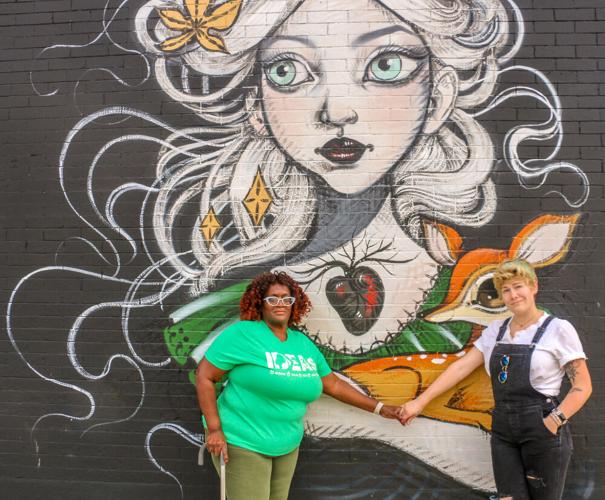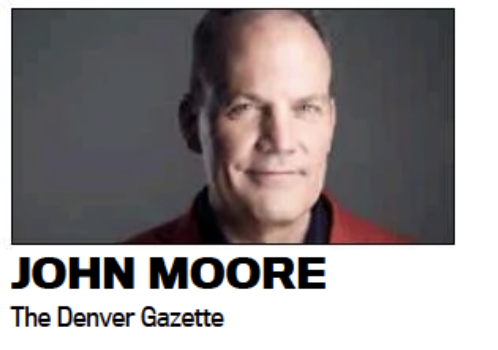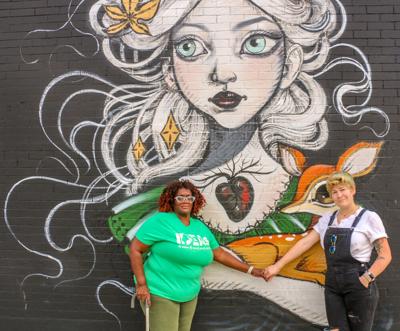
A life in the arts is hard enough. The pay is lousy. The hours are long and odd. The jobs are short-term and intermittent – often requiring additional, flexible part-time jobs to make ends meet. Very few come with benefits like health insurance, child care or enforceable workplace protections.
And, on top of that, sometimes the person running the room is a relic from the old days when yelling, bullying – or worse – were accepted as normal, everyday behavior.
It’s a world where, in healthy working conditions, magic happens. Catharsis. Education. Recalibration. Enlightenment. But it’s a largely unregulated world where a person’s good faith can be easily exploited and bad behavior can flourish.
Imagine, local theatermaker Emma Maxfield said, that you know someone with a job at Google who is regularly exposed to, say, dangerous chemicals over the course of a workday. You would expect an organization like OSHA to step in, uphold basic rules of safety and hold the corporate giant accountable … wouldn’t you?
But for some reason, talking openly about unsafe work conditions in the entertainment industry doesn't summon the same kind of natural indignation. Perhaps a century of sentimentalized lore about Hollywood casting couches and romanticized scandals have made it harder for some artists – mostly but not exclusively women and members of underrepresented communities – to have their stories be fully heard.
“There has been unaddressed harm in our theaters and arts venues for decades – so much so that we have lost great artists and creators who have retreated from the industry because of concerns about their safety and ability to be cast in certain spaces if they speak up,” said Alicia Young, an award-winning actor and the co-founder of a grassroots advocacy organization called IDEA Stages that is working for systemic changes that would promote a safer community-wide theater environment.

Emma Maxfield, left, and Alicia Young are hosting separate events at the Bug Theatre this week, both promoting workplace safety in area theaters.
Artists at the local level are routinely placed in situations that can compromise their physical or emotional safety. If you work at Google and a co-worker makes a pass at you, you can report the offender to Human Resources. But if you are an actor, your job might actually require you to fully participate in moments of implied intimacy or physical violence with a stranger – which, unless thoughtfully planned and executed, can easily go sideways. I remember seeing a local performance of “Othello” where the woman playing Desdemona was so realistically choked on stage, you could see the bruising on her neck from the audience. Because she really got choked.
Working in the theater is not like working at Google. Working in a theater can be an emotional minefield. And there’s no OSHA for artists. Which means that artists sometimes have to blow their own whistles.
And this week, it’s, blow, Gabriel, blow at the Bug Theatre in northwest Denver.
Young and Maxfield represent separate but like-minded groups that are hosting very different community events at the Bug that are both public calls for further conversation and action.
On Monday (Aug. 14), Maxwell is hosting “Into the Fire,” a gathering specifically born of a recent production of a play that disintegrated into charges of unpaid wages, verbal abuse and an unsafe work environment, landing one performer at an urgent care center (among other injuries). “Into the Fire,” she said, “will be a cabaret of sorts,” with both songs and storytelling segments featuring prominent figures in the local arts community sharing transformational moments in their creative lives – both for the better and for the worse. She does not intend for it to be an evening of “bashing and gossip and (bleep)-talking,” she said, but rather as “an opportunity for these artists to share how the local arts community can further support the beautiful things that have happened – or provide support and advocacy and action to prevent the more negative things from happening again.”
And on Sunday (Aug. 20), Young’s IDEA Stages will host a more formal community conversation at the Bug billed as “RRR: Report, Resources, Recovery.” The goal, Young said, is to demand rehearsal spaces where artists can feel both brave and safe. “We hope to leave the night with next steps on how to create accountability measures, including a ‘Safe to Tell’ reporting system,” she said. “We hope to allow community members to be a part of a space where they feel empowered to share their voice and experience.”
For Maxfield, the objective is terribly simple.
“People have a right not to feel scared to go to work,” she said.
A public reckoning
That wasn’t the case in 2018 when as many as 25 women, Maxfield said, were victimized by a local music director whose overt and unchecked sexual-intimidation tactics directly led to the downfall of a 13-year-old Denver theater company and left many with enduring emotional scars.
The man, she said, targeted young women who performed for the company, many under age 21.
“He assaulted the women in his crosshairs with unwelcome, sexually harassing and belittling messages, and he was never held accountable,” Maxfield said. “He went on to escalate his bad behavior on other shows he was working on, ranging from making people generally uncomfortable to demonstrating lewd and sexually violating behavior toward female members of the staff.”
Maxfield said when she first met the man, he told her he loved that the live band was set up to play backstage because that meant he could watch female cast members make quick costume changes. As a result, she said, “I completely changed where I was changing my clothes backstage, because I didn’t feel safe.”
The women reported these incidents to company officials, and, when nothing happened, they took their complaint directly to management of the Bug Theatre, which acted quickly to banish the company that was renting its facility from ever performing at the Bug again.
But the issue of workplace safety can range from just one predator or bully in a position of power to entire institutions. Central City Opera, for example, is only now emerging from perhaps the ugliest labor chapter in its history, one that culminated with the resignation of CEO Pamela A. Pantos shortly after the start of the 2023 summer season. The American Guild of Musical Artists – the union representing most of the company’s performers and production artists – publicly posted allegations including body shaming, sexual harassment, withheld pay and “overt threats of retaliation for union activity.”
Pantos’ resignation surely brought a collective sigh of relief, one former employee told the Denver Gazette. “They are going to have to do a lot of reputation- and trust-building to repair the damage – but the company is better off now (that Pantos has resigned).”
In May, Opera Colorado took on the blatant racial stereotypes that are inherent in Puccini's “Turandot” with an acclaimed (and sold-out) production. Alec Powell was a member of the chorus, and he said their contribution was one major reason for the positive reception. “The chorus' role in ‘Turandot’ is one of the most involved and difficult choruses in all of opera,” he said. To prepare, rehearsals were held up to four times a week for a month and a half. “We were held to impeccably high standards,” said Powell, whose $600 stipend, he figures, came out to about $5 an hour in the end.
The chorus, stage and production crews have initiated the process of unionization “over fair compensation and disrespectful treatment,” Powell said – an effort management is opposing “in incredibly patronizing and disrespectful ways.” In a hearing, he said, reading from a transcript, management referred to chorus members as "not highly skilled” and “hobbyists" who do not take music as a serious career path.
“That's where things got personal for me,” said Powell. “I will be paying off student loans for the rest of my life for this career path. … But even if a member of the chorus were to identify themselves as a hobbyist, they would still be held to an equally high standard of professionalism by the company. So shouldn't they also receive fair compensation for their work?”
Coming from a place of play
Most theater artists are drawn to the stage at a young age because theater can be a home, a place to belong, a place to feel safe in an often unsafe outside world. It’s often mistaken for playtime. One performs in a “play,” after all. But to do so at the highest level often requires a kind of courage that can leave artists on stage and behind it exposed and vulnerable like no other workplace.
When things go wrong, the problem can be traced to a creative leader who is, Young and Maxfield both believe, almost always an established, protected, unchallenged man, often oblivious to the harm he inflicts. And when the man in charge feels open permission to behave badly, that can cultivate damaging cults of silence. “Artists often witness other artists being harassed right out in the open, but they have been conditioned not to say anything,” Maxfield said.

IDEA Stages leads community conversations over a variety of topics, including this one spotlighting artists of color on May 1 at the Lone Tree Arts Center. IDEA Stages will be discussing making safer rehearsal spaces on Aug. 20 at the Bug Theatre.
Much has changed for the better in the local arts community since the downfall of Harvey Weinstein and the dawn of the #MeToo Movement. At least 18 women have been hired into new artistic director positions at Colorado theater companies since October 2017. An entirely new job field called “intimacy direction” takes a more holistic approach to staging the most vulnerable moments of a play. Companies were asked to adopt a 2021 document called the Rocky Mountain Artists’ Safety Alliance Community Standards for Theatre. More companies are being mindful about expanding their storytelling to include traditionally underrepresented playwrights, directors, actors – and audiences.
And yet, alleged incidents of bad behavior against established directors continue to be reported. Which comes as no surprise to Maxfield. “Did you really think, after all of the public furor over #MeToo died down, that all these companies are still fully upholding every single thing that was demanded of them all those years ago?” Maxfield said. “I think it's naive to assume that just because we had a big conversation a few years ago that we don’t have to keep the conversation going.
“And I don't think we should have to censor our reality to keep people in those positions of power comfortable.”
At the same time, Maxfield’s goal is not to simply drum out all those in positions of creative power whose old-school methods have become out of step with the times.
“I do believe that, up to a point, humans can change behavior, because I’ve seen it,” Maxfield said. “Do I think that some of these examples of bad behavior can be used as a teachable moment? Absolutely.”
So does Young, whose IDEA Stages offers workshops where she has witnessed individual transformations first-hand. She does believe in the power of some people to change.
But without hard evidence of changed behavior, they both say emphatically: No.
“We must stop giving second chances to abusers,” said Young. “We must take concerns seriously the first time we hear them. There are unsafe places and people in powerful positions causing this harm. And when we don’t stand as a community to reject this type of behavior, we continue to perpetuate a culture of abuse.”
Maxfield now takes mindful steps to ensure that she only participates in theatermaking with artists she knows to be part of the solution. Recently having worked on The Catamounts' outdoor original play “Pride of the Farm,” the true history of Colorado Attorney General John Metzger’s pursuit of environmental and social justice, she had an epiphany: When you change the work culture … the art gets better.
“When I started working with companies that respected my autonomy as a human person, and my internal needs, my caliber of work increased,” she said. “I was happier about it. I felt more fulfilled as an artist and as a full human being. And I was never scared to go to work.
“So what I'm endeavoring to show everyone on Monday is the power of a community of artists coming together, putting their foot down and saying, ‘No.’ ”

Emma Maxfield, left, and Alicia Young, who are hosting separate events at the Bug Theatre this week promoting safety in local theaters, both believe 'We must stop giving second chances to abusers.'












(0) comments
Welcome to the discussion.
Log In
Keep it Clean. Please avoid obscene, vulgar, lewd, racist or sexually-oriented language.
PLEASE TURN OFF YOUR CAPS LOCK.
Don't Threaten. Threats of harming another person will not be tolerated.
Be Truthful. Don't knowingly lie about anyone or anything.
Be Nice. No racism, sexism or any sort of -ism that is degrading to another person.
Be Proactive. Use the 'Report' link on each comment to let us know of abusive posts.
Share with Us. We'd love to hear eyewitness accounts, the history behind an article.